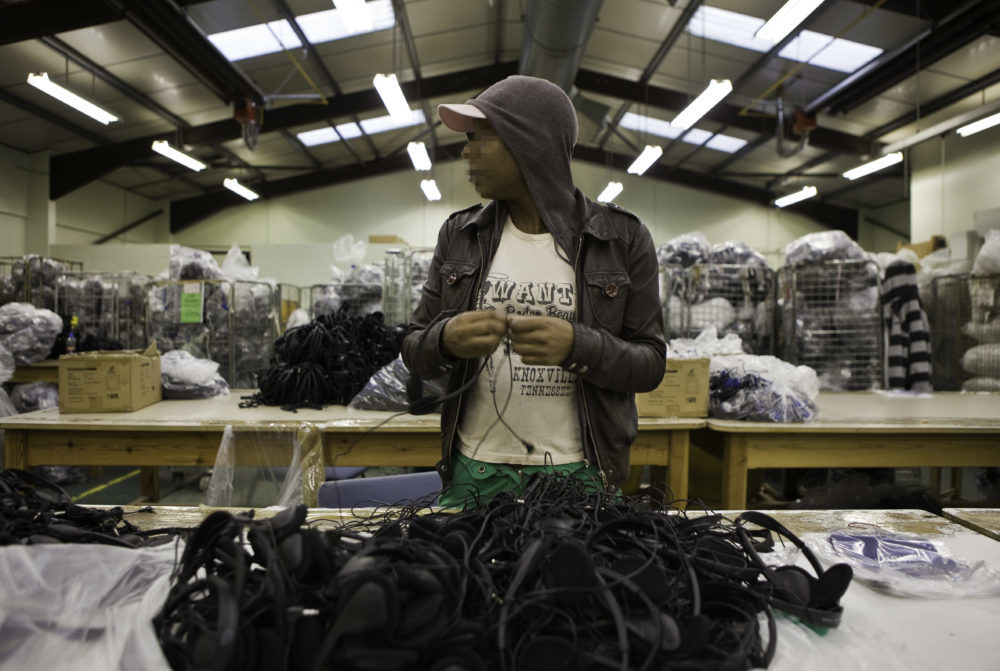Tackling racial disparity means rebuilding trust in the justice system

Airline headphone sorting at HMP Downview. Pic: Andrew Aitchison
The figures tell a damning story, writes Stephen Whitehead. Black people are one and a half times more likely to be sent to prison for an indictable offence at the Crown Court than their white counterparts. People from an ethnic minority make up one seventh of the UK population, but a quarter of those in prison, and a third of those who die in custody. The over-representation of black and minority ethnic (BAME) people in the justice system costs the state an estimated £309m a year.
- Read Eleanor Sheerin’s report on the findings of the Lammy review here.
These statistics offer a grim indictment of how our justice system treats people of colour. It is not surprising, then, that a new Government report, authored by David Lammy MP, finds that the more than half (51%) of British-born BAME people believe that our criminal justice system unfairly discriminates against certain groups.
But what is perhaps more surprising is that over a third (35%) of white British born people agree with them. Where BAME communities face the starkest and most severe discrimination, others groups also face a degree of mistreatment. These statistics highlight that our justice system can function unfairly not just for BAME communities but also for the ‘white working class’ and many others who may feel that the scales of justice are weighted against them.
The issues addressed by the Lammy Review are rightly focused on the tangible racial disparity in the criminal justice system. But the lack of trust in our justice system across a range of communities, what David Lammy calls the ‘trust deficit’, should concern everyone who cares about reducing crime. Research consistently shows that law-abiding behaviour stems from a trust that the justice system is legitimate. When people trust the justice system, they are more likely to co-operate with it and less likely to break the law. As the review puts it: ‘Decisions must be fair, but must also be seen to be fair, if we are to build respect for the rule of law.’
This trust deficit, can and must be tackled. And the justice system itself must play a leading role. This will require root and branch change to culture and practice. But a vital first step to rebuilding trust is to change the way that the justice system treats members of the public. Look at stop and search, for example. For many young people being stopped and searched by the police will be their earliest and most formative experience of the justice system. Research shows that effective stop and search builds rather than degrades trust in the system. It emphasises the value that can be achieved by simple things like communicating respectfully and explaining in plain English the purposes of the search.
Or take the criminal courts. The Centre for Justice Innovation’s own research shows the power of small changes to build trust. For example, one experiment has shown that members of the public who were given explanations of the decision of the court and had a chance to ask questions were more likely to comply with their court orders. We could also learn from Canada which has built trust by offering court liaison officers to defendants from communities who traditionally distrust the system in order to explain the court processes and arrange legal aid.
The Lammy Review recommends addressing the trust deficit by exploring better ways to communicate legal rights to defendants. This approach could go further. Agencies across the justice system, from police (who were outside the remit of the review) to prisons and probation should seek fairer and more transparent ways to communicate with members of the public.
Clearly, ensuring our justice system feels fair to all needs to go hand in hand with efforts to address wider disparities such as the disproportionate targeting of stop and search at BAME people. But, unless our justice system consistently seeks to ensure people feel fairly treated it will continue to have a trust deficit. And that should concern all Britons, regardless of their ethnicity.
This article was published on September 8, 2017






